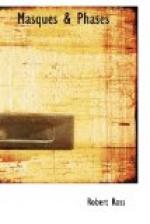ears be soiled with so sordid a confidence? Poor
Irene! she was to have an ‘At Home’ the
following afternoon. It would have to be postponed.
Professor Lachsyrma fell to thinking of such trivial
matters, contemptible in their unimportance, as we
do at the terrible moments of our lives. He
wondered if they would wait dinner for him.
He often remained at his club—the Serapeum—to
finish a discussion with some erudite antagonist.
His absence would therefore cause no alarm.
He consulted the little American clock; it had stopped.
How like America! The only recorded instance,
he would explain to Irene, of an export from that
country being required—the commodity proved
inadequate. No, that would make Irene cry. .
. . The folly of hopeless, futile thoughts jingled
on. Suddenly he heard the cry of a belated newsvendor,
howling some British victory, some horrible scandal
in Paris. Scandal, exposure, publicity—there
was the horror. He could almost hear the journalists
stropping their pens. If his thoughts drifted
towards any potential expiation demanded by officialism,
he put them aside. A social debacle was
more fearful and vivid than the dock and its inevitable
consequence. . . . Presently his eyes rested again
on the mummy case. A brilliant inspiration!
Here, at all events, was a temporary hiding-place
for the corpse of the blackmailer. If it was
putting new wine into old bottles, circumstances surely
justified a violation of the proverb. Till now
a severe unromantic Hellenist, he held Egyptology in
some contempt; and for Egypt, except in so far as
it illustrated the art of Greece or remained a treasure-house
for Greek manuscripts, his distaste was only surpassed
by that of the Prophet Isaiah. A bias so striking
in the immortal Herodotus is hardly shared by your
modern encyclopaedist. While the science of
Egyptology and its adepts command rather awe and wonder
than sympathy from the uninitiated, who keep their
praises for the more attractive study of Greek art.
Yet some of us still turn with relief from the serene
material masterpieces of Greece, soulless in their
very realism and truth of expression, to the vague
and happily unexplained monsters, the rigid gods and
hieratic princes, who are given new names by each
succeeding generation. A knowledge that behind
painted masks and gilded, tawdry gew-gaws are the
remains of a once living person gives even the mummy
a human interest denied to the most exquisite handiwork
of Pheidias.
Professor Lachsyrma at present felt only the impossibility of a situation that would have been difficult for many a weaker man to face. Humiliation overwhelms the strongest. Modern agencies for the concealment of a body having failed to suggest themselves, he must needs fall back on the despised expedient of Egypt. Palaeography and Greek art were obviously useless in the present instance. He understood at last why deplorable people wanted to abolish Greek from the University curriculum.




